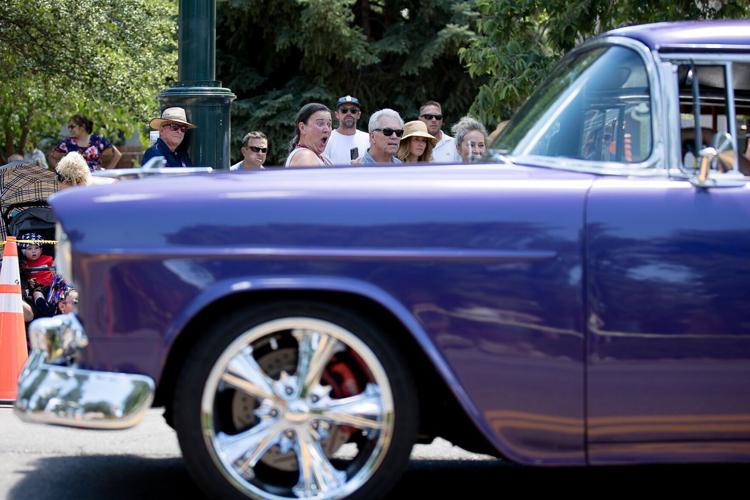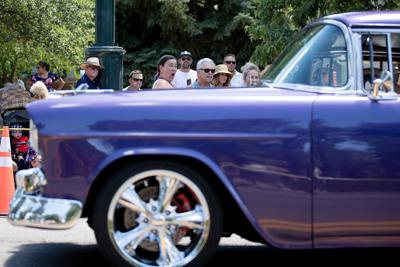Insurance companies may lawfully offer automobile insurance with terms that apply only to antique or classic cars, the Colorado Supreme Court decided on Monday, 6-1.
Under Colorado law, insurance companies must offer policies that contain coverage against uninsured or underinsured motorists, meaning those who cause injuries and whose own insurance is not sufficient to cover the injured person's losses. Previously, the Supreme Court interpreted the requirement to mean that such coverage applies to insured persons, regardless of what vehicle they are in when they get hurt.
However, Essentia Insurance Company asked the Supreme Court to address whether that mandate extends to insurance policies unique to classic cars — permitting an injured person to seek benefits even if they were not in their antique vehicle at the time of the accident. The Supreme Court's majority said no, those policies are a special circumstance.
"The premium for this type of policy is quite low precisely because a limited-use vehicle poses little risk to the insurer," wrote Justice Carlos A. Samour Jr. in the March 25 opinion. "The reality is that a specialty antique/classic-car policy is simply a bird of a different feather."

Justice Maria E. Berkenkotter disagreed with that assessment, instead believing the legislature could explicitly choose to treat antique policies differently if that was its goal. Essentia's requirement that owners of classic cars maintain a separate policy through their regular use vehicles, in her view, should not allow companies to escape the broad requirement for covering people.
"To be sure, many insureds injured in accidents caused by negligent, uninsured or underinsured motorists will not sustain injuries that would justify recovery under more than one policy," Berkenkotter wrote. "But there are, without question, some who will sustain such catastrophic injuries. These are the insureds who most need the protection of the policy or policies that cover them."

Colorado Supreme Court Justice Maria E. Berkenkotter asks a question during oral arguments during Courts in the Community on Thursday, Oct. 26, 2023, at Gateway High School in Aurora, Colo. (Timothy Hurst/Denver Gazette)
In the case before the justices, another driver struck Beverly Hughes while she was in her vehicle. The at-fault driver was underinsured and their policy did not fully cover Hughes' injuries. As a result, Hughes sought and received benefits through the uninsured and underinsured motorist provisions of her own Travelers Insurance policy.
However, Hughes and her husband also owned two classic cars: a 1967 Ford Mustang and a 1930 Ford Model A. Even though Hughes was not in either antique vehicle at the time of the accident, she attempted to access the underinsured motorist provision of that policy, offered by Essentia, to further cover her injuries.
Hughes eventually sued Essentia, relying upon a 2001 decision of the Supreme Court, DeHerrera v. Sentry Insurance Company. There, the court concluded that under state law, uninsured and underinsured motorist coverage applies to people, not to any specific vehicle.
Applying DeHerrera, a three-judge panel for the Court of Appeals agreed Essentia could not turn away Hughes' claim under her classic car policy simply because her injuries occurred in a regular use vehicle — even though the policy was not meant to cover such scenarios, practically speaking.
"Indeed, we concede and fully recognize that what Hughes is seeking is more than she bargained for," wrote Judge Craig R. Welling, but "the Essentia policy doesn’t meet the coverage requirements."
The Supreme Court's majority, however, concluded its prior decision did not apply under the special circumstances raised by antique car ownership.
As part of its classic car policy, Essentia required Hughes to have other insurance coverage for her regular use vehicle, including uninsured and underinsured motorist provisions. The company's rationale was to enable classic car owners to buy far cheaper insurance policies on vehicles that are only used minimally, like for parades and exhibitions. The parties agreed that if Hughes had been injured in her classic car, both sets of policies would cover her.
"But — and this is a pivotal difference — Essentia’s specialty policy was expressly conditioned on the insured having a regular-use car and insuring it through a standard policy," Samour wrote. To allow Hughes to "double-dip" under both of her policies would result in insurers increasing premiums for classic car policies.

Colorado Supreme Court Justice Carlos A. Samour Jr. speaks to students at Pine Creek High School during a Courts in the Community event in Colorado Springs on Thursday, Nov. 17, 2022. (The Gazette, Parker Seibold)
The practical reason for recognizing an exemption for antique vehicles, Samour continued, is that "coverage under such a policy is tailored to the limited use and low risks that inhere to antique/classic-car ownership."
Berkenkotter indicated she was not convinced that Essentia's classic car-only policy complied with state law. She noted the General Assembly in 2007 eliminated a prohibition against "stacking" certain insurance policies to receive additional benefits, as Hughes sought to do.
"To my mind, this raises an important question: If Essentia can’t prohibit Hughes from stacking (underinsured motorist) coverage from both its policy and Travelers’s policy, how can Essentia force her to limit her coverage to essentially accomplish the same end?" Berkenkotter wrote.
The case is Essentia Insurance Company v. Hughes.






(0) comments
Welcome to the discussion.
Log In
Post a comment as Guest
Keep it Clean. Please avoid obscene, vulgar, lewd, racist or sexually-oriented language.
PLEASE TURN OFF YOUR CAPS LOCK.
Don't Threaten. Threats of harming another person will not be tolerated.
Be Truthful. Don't knowingly lie about anyone or anything.
Be Nice. No racism, sexism or any sort of -ism that is degrading to another person.
Be Proactive. Use the 'Report' link on each comment to let us know of abusive posts.
Share with Us. We'd love to hear eyewitness accounts, the history behind an article.